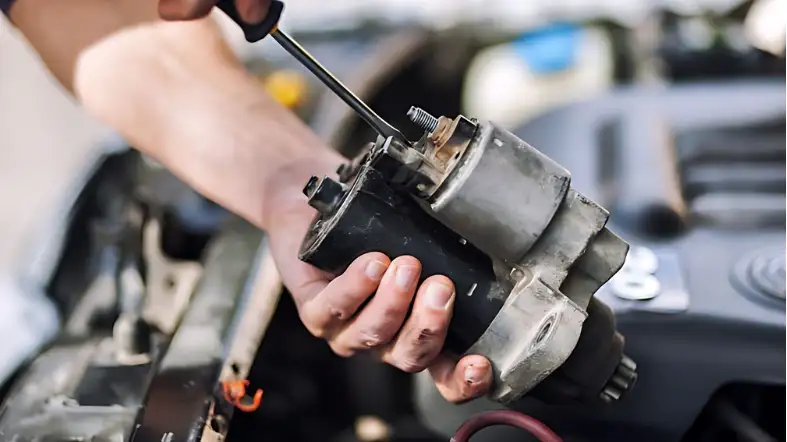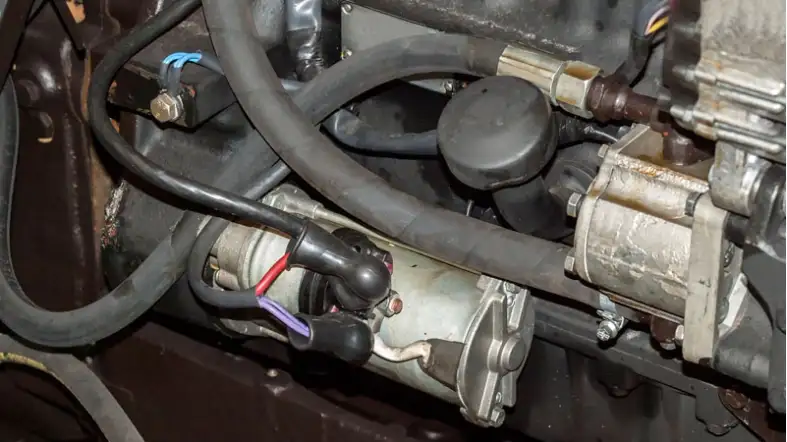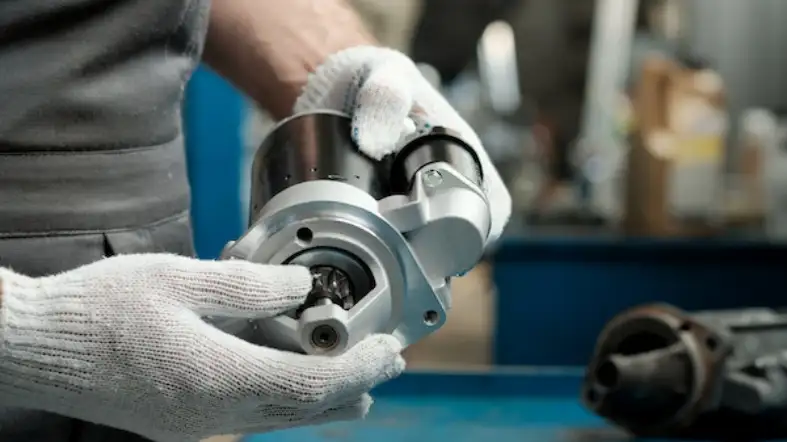Are you having trouble getting your car to start? Does it take multiple attempts or strange noises to get your engine going?
You may be experiencing the all-too-common issue of a bad starter.
Your car’s starter is a crucial component in the ignition process, and when it malfunctions, it can cause frustration and even leave you stranded.
In this blog, we’ll explore the symptoms of a bad starter, so you can identify the issue and get back on the road with confidence.
From strange noises to electrical issues, we’ll cover it all!
What are the symptoms of a bad starter?
The starter is an important component in your car’s engine that helps to get it running.

When you turn the key in the ignition, the starter is responsible for cranking the engine over so that it can start.
If you have a bad starter, you’ll likely notice a few different symptoms that indicate that there’s a problem. Here are some of the most common signs of a bad starter:
1. Engine won’t start:
This is the most obvious symptom of a bad starter. If you turn the key in the ignition and the engine doesn’t start, it’s possible that the starter has failed.
2. Clicking sound:
If you turn the key and hear a clicking sound but the engine doesn’t start, it’s possible that the starter motor is trying to engage but isn’t able to turn the engine over.
3. Grinding noise:
If you hear grinding noise when you try to start the engine, it’s possible that the starter’s gear isn’t engaging properly with the engine’s flywheel.
This can cause damage to both components, so it’s important to get it checked out right away.
4. Slow cranking:
If the engine cranks slowly when you turn the key, it’s possible that the starter motor is getting weak and may fail soon.
5. Dashboard lights dimming:
If you notice that the dashboard lights dim when you try to start the engine, it’s possible that the starter motor is drawing too much power and is causing an electrical problem.
What are the causes of a bad starter?

Firstly, a bad starter is usually caused by one of three things: a weak battery, a faulty starter motor, or a damaged starter solenoid.
Let’s take a closer look at each of these potential causes:
1. Weak battery:
Your car’s battery is responsible for supplying power to the starter motor.
If the battery is weak or dead, it won’t be able to provide enough power to turn the engine over, and your car won’t start.
This can happen for a number of reasons, including old age, a lack of maintenance, or leaving your lights on for an extended period of time.
2. Faulty starter motor:
The starter motor is responsible for turning the engine over when you turn the key in the ignition.
If the starter motor is faulty, it won’t be able to do its job properly and your car won’t start.
This can happen due to a number of reasons, such as worn-out brushes, a damaged armature, or a faulty solenoid.
3. Damaged starter solenoid:
The starter solenoid is responsible for engaging the starter motor with the engine.
If the solenoid is damaged, it won’t be able to do its job properly and your car won’t start.
This can happen due to a number of reasons, such as worn-out contacts, a faulty plunger, or a damaged coil.
In addition to these three main causes, there are a few other things that can cause a bad start. These include:
1. Loose or corroded connections:
If the connections between the battery, starter motor, and starter solenoid are loose or corroded, the starter may not be able to receive enough power to function properly.
2. Ignition switch problems:
If there’s an issue with your car’s ignition switch, it may not be able to send the necessary signal to the starter solenoid to engage the starter motor.
3. Fuel system issues:
If your car’s fuel system isn’t functioning properly, your engine may not be able to start, even if the starter motor is working correctly.
How to fix a bad starter?

Here are some steps to fix a bad starter:
1. Check the battery:
Before attempting to diagnose the starter, make sure your car battery is fully charged and in good condition. A weak battery can cause the starter to malfunction.
2. Listen for noise:
Turn the key to the start position and listen for any noises coming from the starter.
If you hear a clicking sound, it could be a sign of a bad starter solenoid or low voltage. If you hear a grinding noise, it could be a sign of worn starter gears.
3. Inspect the starter:
If you suspect the starter is the problem, locate it under the hood of your car. Inspect the wiring, connections, and bolts to ensure they are secure and free from corrosion.
4. Test the starter:
To test the starter, use a multimeter to check for voltage at the starter solenoid.
If there is no voltage, check the wiring and connections. If there is voltage, the starter may be faulty.
5. Replace the starter:
If the starter is faulty, it will need to be replaced. Purchase a replacement starter from a reputable auto parts store and follow the manufacturer’s instructions to install it properly.
6. Consider a professional:
If you are not comfortable diagnosing or replacing the starter yourself, consider taking your car to a professional mechanic.
They have the tools and expertise to diagnose and fix the problem correctly.
How to prevent a bad starter?
Having a bad starter can be a frustrating experience. Not only can it leave you stranded, but it can also cause damage to your car’s electrical system.
Fortunately, there are several things you can do to prevent a bad starter from happening. Here are some tips:
1. Keep your battery in good condition:
A weak or dead battery can put a strain on your starter, causing it to wear out prematurely.
Make sure to keep your battery charged and replace it if it’s not holding a charge.
2. Avoid short trips:
Short trips don’t give your car’s battery enough time to recharge fully. This can lead to a weakened battery, which can put more stress on your starter.
3. Check your electrical system:
A faulty alternator or voltage regulator can cause your battery to not charge properly, which can damage your starter.
Make sure to have your electrical system checked regularly.
4. Use the right oil:
Using the wrong type of oil can cause your engine to work harder, which can put more strain on your starter.
Make sure to use the oil recommended by your car’s manufacturer.
5. Don’t overload your car:
Carrying too much weight in your car can put more strain on your starter, as well as your engine and suspension. Try to keep your car as light as possible.
6. Turn off all accessories:
Before starting your car, make sure to turn off all accessories, such as the radio and lights. This will reduce the strain on your starter and battery.
7. Replace worn-out parts:
If you notice any signs of wear or damage to your starter or other parts of your car’s electrical system, make sure to have them replaced as soon as possible.
Waiting too long can lead to more serious problems.
FAQs
1. Can I Replace The Starter Myself, Or Do I Need To Take It To A Mechanic?
Replacing a starter can be a tricky job, especially if you don’t have much experience working on cars.
If you’re not confident in your ability to replace the starter yourself, it’s best to take it to a mechanic.
They’ll be able to diagnose the problem and replace the starter if necessary.
2. How Long Does A Starter Typically Last?
The lifespan of a starter can vary depending on a number of factors, such as how often you drive your car and how well you maintain it.
In general, a starter can last anywhere from 50,000 to 100,000 miles.
3. Can A Bad Starter Damage Other Parts Of My Car?
Yes, a bad starter can potentially cause damage to other parts of your car, such as the battery or alternator.
If you suspect that your starter is failing, it’s important to have it checked out by a mechanic as soon as possible to prevent further damage.
4. Can A Bad Starter Drain The Battery?
Yes, a bad starter can sometimes drain the battery.
This can happen if the starter is drawing too much power from the battery, which can cause it to drain more quickly than normal.
If you notice that your battery is dead or low on power even when you haven’t been using your car, it’s possible that the starter is the culprit.
5. How Do You Test A Starter?
There are a few ways to test a starter to see if it’s working properly.
One method is to use a multimeter to check the voltage at the starter terminals while someone else tries to start the car.
You can also try tapping the starter with a hammer or other tool while someone else turns the key to see if it starts working again.
If you’re not comfortable testing the starter yourself, it’s always a good idea to take your car to a mechanic for a professional diagnosis.
6. Can you still drive a car with a bad starter?
It’s not recommended to drive a car with a bad starter. If the starter fails completely while you’re driving, you could be stranded and unable to start your car again.
It’s always best to have a bad starter replaced as soon as possible to avoid any potential safety issues.
Conclusion
If you’re experiencing issues starting your vehicle, there’s a chance that you have a bad starter.
Some of the symptoms that may indicate a bad starter include hearing a grinding noise when you turn the key, a slow crank or no crank at all, and your vehicle’s dashboard lights dimming when you try to start the engine.
It’s important to get your vehicle checked by a professional mechanic as soon as possible if you’re experiencing any of these symptoms to avoid being stranded and potentially causing further damage to your vehicle.
